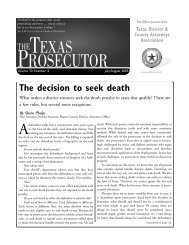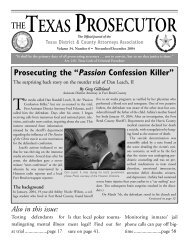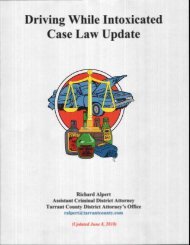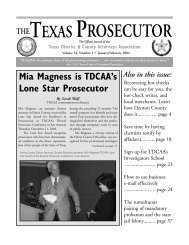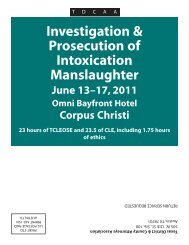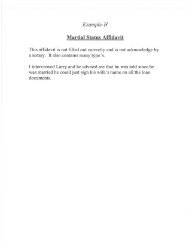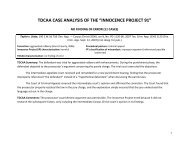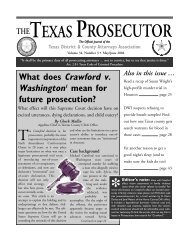Driving While Intoxicated Case Law Update - Texas District ...
Driving While Intoxicated Case Law Update - Texas District ...
Driving While Intoxicated Case Law Update - Texas District ...
Create successful ePaper yourself
Turn your PDF publications into a flip-book with our unique Google optimized e-Paper software.
offense of DWI," the Court finds this to just be a statement of the officer's "belief' and not a<br />
statement of 'Tact" which distinguishes fhrs case from Dugas as it holds affidavit did not state the<br />
offense date. Trial judge suppressrbn is affirmed. This holding was reversed by the Court of<br />
Criminal Appealswhich upheld the warrant. ln its holding the Court sfafes thatthe four corners of<br />
a warrant affidavit have to be considered to determine probable cause, rejecting the approach of<br />
the lower Court which seemed to be testing the introductory statement and the description of facts<br />
separately. lt held that the magistrate could infer that obseruations of defendant's conduct<br />
occurred on the date specified in the introductory statement and find that this was the date of<br />
offense. Magistrate had substantial basis to determine evidence of intoxication would be found in<br />
defendant's blood. Evidence of any amount of alcohol or other controlled subsfance could be<br />
probative of intoxication as it is evidence that suspect introduced substance into his body.<br />
(b) FArAL<br />
Crider v. State,2011 WL 5554806 (Tex.Crim.App. 2011).<br />
Affidavit in support of search warrant to draw blood from defendant, who had been anested for<br />
DWI, was insufficient to establish probable cause that evidence of intoxication would be found in<br />
defendant's blood at the time the search warrant was rssued. Affidavit did not state the time that<br />
the officer conducted traffic stop of defendant's vehicle, and nothing in the four corners of the<br />
affidavit suggesfed what time gap existed between defendant's last moment of driving and the<br />
moment the magistrate signed the warrant; such that there could have been a 25-hour gap<br />
between the time the officer first stopped defendant and the time he obtained the warrant.<br />
3. SEARCH WARRANTAFFIDAVIT LISTED THE WRONGYEAR NOT FATAL<br />
Schornick v. State, 2010 WL 4570047 (Tex.App.-Fort Worth 2010).<br />
This involved a warrant where the officer erroneously listed the stop occurred on January 21 , 2008,<br />
ratherthan January 31, 2009. Atthe hearing officertestified that itwas a clerical error. Trial Court<br />
denied MTS. Trial Court holding was affirmed.<br />
4. SEARCH WARRANT AFFIDAVIT HAVING MULTIPLE CLERICAL<br />
ERRORS NOT FATAL<br />
Salzido v. State , 2011 WL 1796431 (Tex.App.-Amarillo 2011, pet. ref'd).<br />
Defense attacked warrant because an erroneous date, June 7, 2008, was listed in warrant's first<br />
word paragraph and the name "Hoover" appeared once where the name Salzido should have been.<br />
He further pointed out the warrant affidavit stated the defendant was asked to pertorm standard<br />
field sobriety test drills (plural), when only one standard field sobriety test drill was performed<br />
(HGN). Trial Court denied the motion. ln upholding the warrant, the Court referred to the effors<br />
in the date and name as clerical errors based on the officer's failure to change names in the<br />
template he used. The explanation, that the defendant was initially asked to perform drills and that<br />
so/ne were not later offered due to back rssue, adequately explained why that mistake was not a<br />
problem. Even without the FST, there was sufficient other evidence to support the PC.<br />
101



